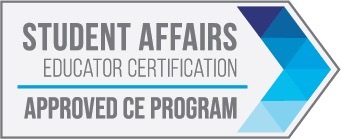
Engagement by Design: Strategies for building a successful co-curricular model
Co-curricular activities are crucial to students' overall development and success, providing opportunities to enhance their skills, knowledge, and experiences outside of the traditional academic curriculum. The presenters will discuss the importance of student engagement in co-curricular programming and its role in supporting student success. Presenters will delve into proven strategies and practices for designing and implementing a successful co-curricular program based on existing programs created by the presenters.
Learning Outcomes:
- Understand key theoretical foundations such as Astin's developmental theory of student involvement and Kuh et al.'s factors contributing to student success in college.
- Understand key elements to design and implement a successful institution-wide co-curricular model.
Rayshawn L. Eastman, Ph.D.
Associate Vice President for Student Affairs
Wilmington College
Rayshawn L. Eastman, Ph.D. currently serves as Associate Vice President for Student Affairs at Wilmington College. He is an unyielding educator committed to the holistic development of students. In addition, he serves students as a scholar-practitioner dedicated to applying student development and learning theories to practice. Dr. Eastman consistently creates safe and inclusive environments where students are challenged to take ownership of their educational experience while ensuring they have the proper support systems to learn and develop. During his career, Dr. Eastman has created and implemented an array of collaborative student success programs and initiatives. Of note, Lions 1st Scholars Community (first-generation student program), Quaker Up! Experience (student life co-curricular engagement framework), and the Mosaic Inclusion Center (Mount St. Jospeh’s first ever multicultural center). Dr. Eastman’s research focuses on co-curricular learning, retention, holistic student experiences, sense of belonging, organizational development, organizational resource allocation practices, and higher education finance and budgeting.
Continuing Education Credits
This session counts for 1.0 CSAEd-CORE credit
NASPA has been approved by the Higher Education Consortium for Student Affairs Certification to provide CE credit for Certified Student Affairs Educators (CSAEd). NASPA is solely responsible for all aspects of this program.
Guidelines for earning CE credit:
No partial credit will be rewarded.
Credit is available for attending the live session or viewing the on-demand recording, not both. While on-demand is available to registrants for 365 days, CSAEd credits and certificates must be retrieved no longer than 60 days after the event (June 7, 2024).
To receive CSAEd credit, attendees must complete the Feedback Survey in the session offering the certification. Once the survey is completed, your Certificate will be available on the Virtual Conference Continuing Education website. The Certificate of Completion, which will show the event and credit earnings, is available for download and/or print from the event in your Online Learning Community.


